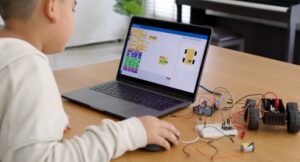In today's society, television has become an essential part of family entertainment. Many parents worry that too much screen time may negatively affect their children's eyesight and attention. However, when selected carefully, TV programs can have a positive impact on children's growth and education. This article will explore the benefits of watching TV with your child and how this activity can strengthen the parent-child relationship, foster cognitive development, and improve social skills.
The Benefits of Watching TV with Your Child: A Bonding Opportunity
Watching TV together offers valuable opportunities for parents and children to interact and communicate, which helps foster a stronger emotional bond. Whether it's watching a family movie or enjoying your child's favorite cartoon, these moments are an important part of the parent-child connection.
Spending Quality Time Together
Modern parents often struggle to find quality time to spend with their children due to work and life pressures. Watching TV together allows parents to enjoy a relaxed and enjoyable moment with their children, strengthening emotional connections.
Interaction and Communication
While watching TV, parents and children can discuss the plot, characters, or lessons learned, helping children better understand the content and developing their critical thinking and communication skills.
Educational Benefits of TV
Appropriate TV shows can be a valuable part of children's education, especially those with educational content. By watching inspiring and informative programs, children can expand their knowledge and broaden their horizons.
Enhancing Language Skills
Children’s shows not only help kids learn new vocabulary and expressions but also improve their comprehension and speaking abilities through engaging dialogues and character interactions.
Broadening Knowledge
Educational TV programs like "Science World" or "Animal Planet" can spark children's curiosity, allowing them to learn about natural sciences, world cultures, and social issues.
Developing Social Skills
Programs focused on social interaction (such as "Sesame Street") teach children cooperation, sharing, and expressing emotions, thus helping to develop social skills and empathy.
How TV Promotes Cognitive Development
Television isn’t just an entertainment tool—many programs with complex storylines and diverse structures can effectively stimulate children's cognitive development, particularly their logical thinking and problem-solving abilities.
Enhancing Logical Thinking and Reasoning Skills
Many children's programs present intellectual challenges and problem-solving questions that encourage kids to think critically and analyze situations, fostering their ability to solve problems.
Stimulating Creativity
Shows in genres like sci-fi or animation, filled with imagination and creativity, stimulate children’s creative thinking, encouraging them to try new ideas in their daily lives.
A Healthy Form of Entertainment
When used appropriately, television can be a healthy form of entertainment. Watching TV together can help parents control their children’s screen time and ensure their physical and mental well-being.
Balancing Entertainment Time
Parents can set daily TV-watching limits to ensure children have enough time for other beneficial activities like outdoor play or reading.
Family Entertainment Choices
Family movie nights or watching suitable children's programs together promote bonding, fostering a close-knit family dynamic.
Developing Critical Thinking and Information Filtering Skills
In today’s media landscape, children are exposed to a broad range of content. Parents can help them develop critical thinking skills by teaching them how to analyze the information presented in TV programs and distinguish between credible and unreliable content.
Final Thoughts
Watching TV together has multiple benefits for children’s development. From enhancing the parent-child bond to boosting educational and cognitive skills, television can play an important role in a child's growth. Parents should carefully choose age-appropriate and meaningful programs while setting healthy screen time limits. By striking a balance between entertainment and learning, children can benefit from watching TV without the risks associated with excessive screen time.
Q&A
Q1: Is it okay to watch TV with my child every day?
A1: Watching TV with your child every day can be beneficial if the content is educational and family-friendly. It’s important to ensure that screen time is balanced with other activities like outdoor play, reading, and family interactions.
Q2: How can I ensure my child watches age-appropriate TV shows?
A2: Always check the TV show’s rating and read reviews or guides on the content. Opt for shows with educational themes that are suitable for your child’s age and maturity level. Parental control features on TVs or streaming platforms can help limit content based on age.
Q3: What are the signs that my child is watching too much TV?
A3: Signs of excessive TV watching include difficulty concentrating, a decrease in physical activity, disrupted sleep patterns, or irritability when the TV is turned off. It’s important to monitor screen time and ensure a balance between different types of activities.
Q4: Can watching TV together help with parent-child communication?
A4: Yes, watching TV together provides an opportunity for parents to engage in conversations with their children about what they’re watching. It can help improve communication, build trust, and create bonding moments that are essential for healthy relationships.
References:
- American Academy of Pediatrics. (2016). "Media and Children."
- Common Sense Media. (2022). "How to Manage Screen Time for Kids."
- Mayo Clinic. (2021). "How to Balance Screen Time for Children."
- National Institute of Child Health and Human Development. (2020). "Children and Media."
- BBC. (2020). "How TV Shows Impact Children’s Development."
- Harvard Health Publishing. (2021). "The Role of TV in Children’s Development."













